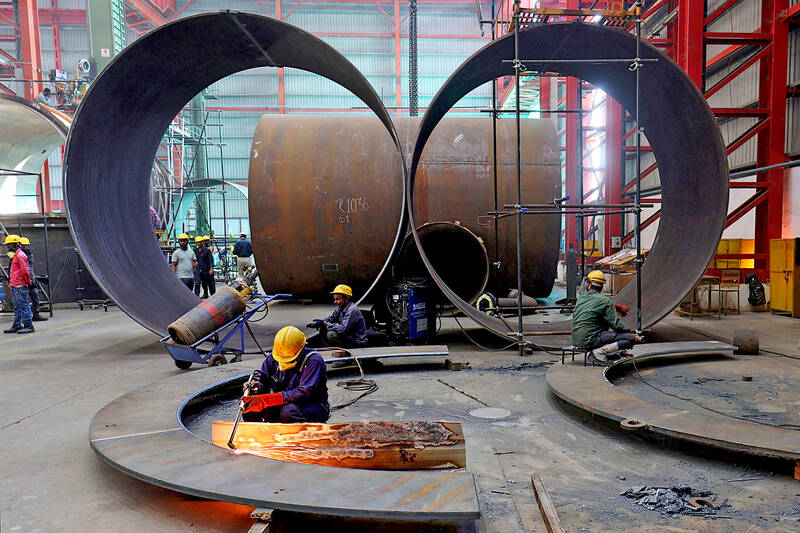Factories across Asia expanded at a lackluster pace last month as demand cooled, ahead of a trade war that US President Donald Trump launched on the weekend.
The purchasing managers’ index gauge for manufacturing-heavy countries showed tepid activity, according to the S&P Global.
In Vietnam, the index contracted further to 48.9 as output fell for the first time in four months, and in South Korea, activity improved slightly to 50.3, just above the 50-mark indicating expansion.

Photo: Reuters
Across Southeast Asia, activity fell to an 11-month low of 50.4. Five major economies including Japan showed a deterioration overall while South Korea, Indonesia and Malaysia showed slight improvement.
Manufacturing growth eased in China to the weakest in four months and below economists’ expectations.
The biggest drags on activity across many countries were output and new orders. In a sign of weakening demand from abroad, export orders fell for the third month in a row in Vietnam, demand eased in Taiwan and contracted for an eighth month in Japan. Export orders rose slightly in South Korea.
Purchases of inputs slowed to a three-month low and confidence remained subdued across Southeast Asia, S&P said.
“New orders and output both expanded at a softer pace, and the export market continued to hold back overall sales growth,” S&P Global Market Intelligence economist Maryam Baluch said in a statement yesterday.
The latest figures show the state of trade across the region before Trump announced tariffs over the weekend on the US’ three largest trading partners China, Mexico and Canada. The levies are set to upend trade globally, though could also shift demand for production to many countries across Asia as firms seek to avoid tariffs.
Trump also said that levies are coming soon for the EU, signaling an expansion of the trade battle.
The region faces mounting challenges in the year ahead. Slowing economic growth in China, Europe and the US has reduced demand for exports, including chips and technological goods that Taiwan and South Korea specialize in making.
Protectionism globally is also a growing risk. While Trump has avoided issuing tariffs or threats of levies against most countries in the region — with China being a major exception — his administration has made trade deficits a major focus. The impact of levies on China are also set to dent activity in the world’s second-largest economy, with spillovers across the region.

In Italy’s storied gold-making hubs, jewelers are reworking their designs to trim gold content as they race to blunt the effect of record prices and appeal to shoppers watching their budgets. Gold prices hit a record high on Thursday, surging near US$5,600 an ounce, more than double a year ago as geopolitical concerns and jitters over trade pushed investors toward the safe-haven asset. The rally is putting undue pressure on small artisans as they face mounting demands from customers, including international brands, to produce cheaper items, from signature pieces to wedding rings, according to interviews with four independent jewelers in Italy’s main

Japanese Prime Minister Sanae Takaichi has talked up the benefits of a weaker yen in a campaign speech, adopting a tone at odds with her finance ministry, which has refused to rule out any options to counter excessive foreign exchange volatility. Takaichi later softened her stance, saying she did not have a preference for the yen’s direction. “People say the weak yen is bad right now, but for export industries, it’s a major opportunity,” Takaichi said on Saturday at a rally for Liberal Democratic Party candidate Daishiro Yamagiwa in Kanagawa Prefecture ahead of a snap election on Sunday. “Whether it’s selling food or

CONCERNS: Tech companies investing in AI businesses that purchase their products have raised questions among investors that they are artificially propping up demand Nvidia Corp chief executive officer Jensen Huang (黃仁勳) on Saturday said that the company would be participating in OpenAI’s latest funding round, describing it as potentially “the largest investment we’ve ever made.” “We will invest a great deal of money,” Huang told reporters while visiting Taipei. “I believe in OpenAI. The work that they do is incredible. They’re one of the most consequential companies of our time.” Huang did not say exactly how much Nvidia might contribute, but described the investment as “huge.” “Let Sam announce how much he’s going to raise — it’s for him to decide,” Huang said, referring to OpenAI

The global server market is expected to grow 12.8 percent annually this year, with artificial intelligence (AI) servers projected to account for 16.5 percent, driven by continued investment in AI infrastructure by major cloud service providers (CSPs), market researcher TrendForce Corp (集邦科技) said yesterday. Global AI server shipments this year are expected to increase 28 percent year-on-year to more than 2.7 million units, driven by sustained demand from CSPs and government sovereign cloud projects, TrendForce analyst Frank Kung (龔明德) told the Taipei Times. Demand for GPU-based AI servers, including Nvidia Corp’s GB and Vera Rubin rack systems, is expected to remain high,